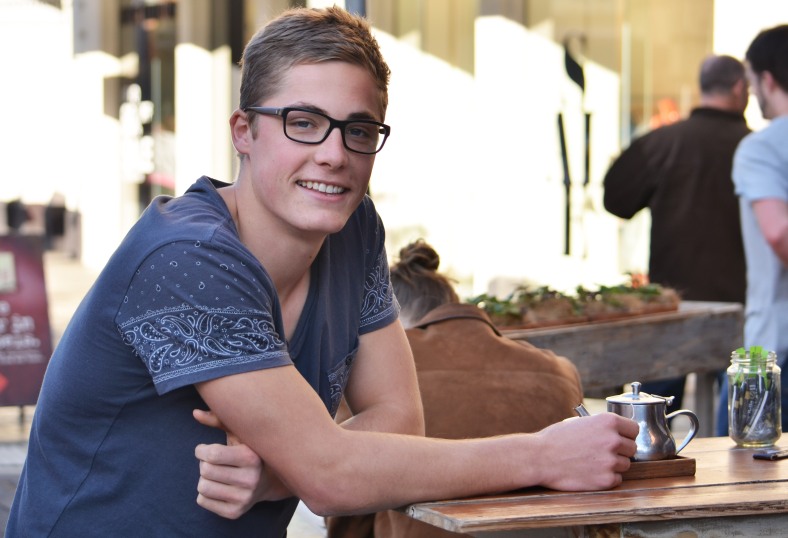
Not going through life on default
TANYSHA BOLGER – JUNE 18, 2014
Following up from our interview with Lewis Horwood back in July of 2013, Lewis has completed an Iron Man distance triathlon and a 130km run on the Heysen Trail starting from Mt. Lofty and ending at The Bluff, in the coastal town of Victor Harbor. The 130km run took Lewis from early morning till late at night to complete, but it was a challenge he was willing to conquer.
With fitness and sport being prominent throughout his family, his first challenge this year was to complete an Iron Man distance triathlon with his father, who retired from endurance running with the completion of the triathlon.The triathlon event that Lewis and his father completed involved a 3.8km swim, 180km ride and 42km run.
“The Ironman with Dad was really a strange day for me, it never really stopped feeling like we were joking about doing it all, even after I had finished. We both had no idea what it was going to be like, and were ridiculously unprepared for it. I had never swam or ridden that far in my life; we had no spare bike tubes, and barely any water for the ride.”
“As weird as it sounds, I think that made it almost more special for me. The day just had a real ‘Horwood wing-it’ kind of feel to it. It was an awesome thing to be able to do with my extended family there, and particularly with my Dad – it was a surprisingly emotional day. It really struck me how similar he and I are.”
In preparation for the Mt. Lofty to the Bluff run, Lewis tried to focus on removing any concern over how long the run would take, or how much he would struggle. For Lewis it was about the enjoyment of it all, and the change in his attitude about the run helped him succeed.
“I didn’t want to run with a watch, I didn’t care if I was going to get to the point where all I could do was stumble through the darkness; I just wanted it to be an adventure, more than anything, like I was a child again.”
Constantly doubting himself, Lewis realised that thinking negatively is something internal and that those thoughts can constantly convince him to give up and stop running.
“It can be downright soul crushing, you always, at some point, get close to the edge of giving up. Splitting what lays in front of you into manageable portions is useful – say to yourself “I can run five kilometres in my sleep” enough times, and you won’t have a problem believing it. I try to fight nagging doubts as they arrive with realistic self-reassurances of my own ability.”
“I was lucky to learn from Peter Daish, a Victor Harbor endurance legend, that the feeling of accomplishment when finishing something far outweighs the pain of actually doing it, and so I tried to picture how much better I would feel in a few hours.”

Keeping relatively healthy is a main part of Lewis’ lifestyle, but says there’s always room for improvement. Eating lots of fruits, vegetables, grains and having a mostly vegan diet for quite a while has helped to shorten his recovery time post endurance running.
“I know two years ago I could not have done a run like this two weeks after an Ironman-distance triathlon, and I think diet has been a big factor.”
“It would probably be fair to argue that my physical preparation wasn’t a huge consideration before the Adelaide-Victor run, and perhaps I didn’t give my body enough thought/time to recover prior to setting out. I just felt really strong internally after the triathlon a couple of weeks earlier. Feeling strong is a big part of it – that said, I was fully prepared to be knocked flat by the run, and so I wasn’t too concerned about what would happen when those doubts arrived.”
Endurance running isn’t all about the physical and mental preparations, it has taught Lewis a few life lessons.
“I like to think that events like these are kind of a dramatic representation of my entire life, just compressed into a day or so. There are exhilarating highs and feelings of completely peace, followed so shortly by doubt, frustration and misery.”
“So doing these kinds of things I think is starting to better prepare me for handling the inevitable ups and downs of everyday life. Running like this can teach you to accept that ease and happiness are not the default human settings, but just points on a broad spectrum of human emotions that you will feel at some point.”
“You learn that tough times will confront you, but that they are just another part of life, and are worthwhile in their own way. I learn a lot more when things are going badly. It also kind of encourages an acceptance of “wholeness”, rather than just happiness and immediate reward, and I think that’s a good thing. Definitely something I am trying to work on.”
But it also wasn’t all smooth sailing, sweat and tears. The Heysen Trail extends through various land around the Adelaide foothills, passing through towns such as Bridgewater, Mylor and eventually snaking around through Victor Harbor. It does pave the way for a few various unexpected encounters.
“There was a few unsettling dawn encounters with the Police in the middle of Kuitpo forest. I actually got chased out of paddocks by bulls outside of Mylor, and I jumped over brown snakes and spent an hour lost in thick scrub, dependant on a compass that I hardly knew how to operate. That sort of made the run quite interesting to say the least.”
Lewis is a sponsored athlete for Merrell, but is not focusing on major events at the moment, rather he is aiming to improve his peak fitness level and endurance running ability.